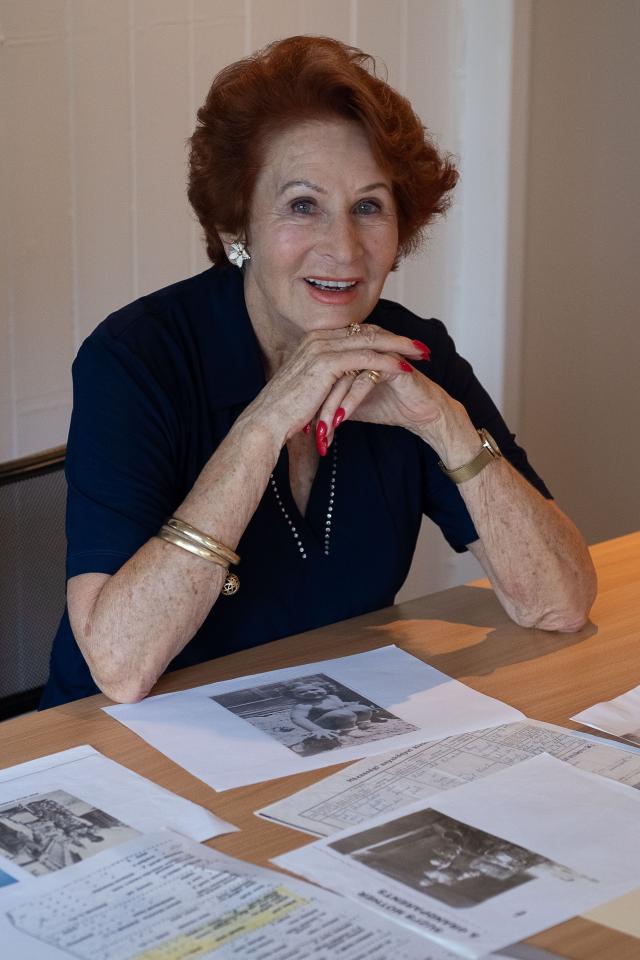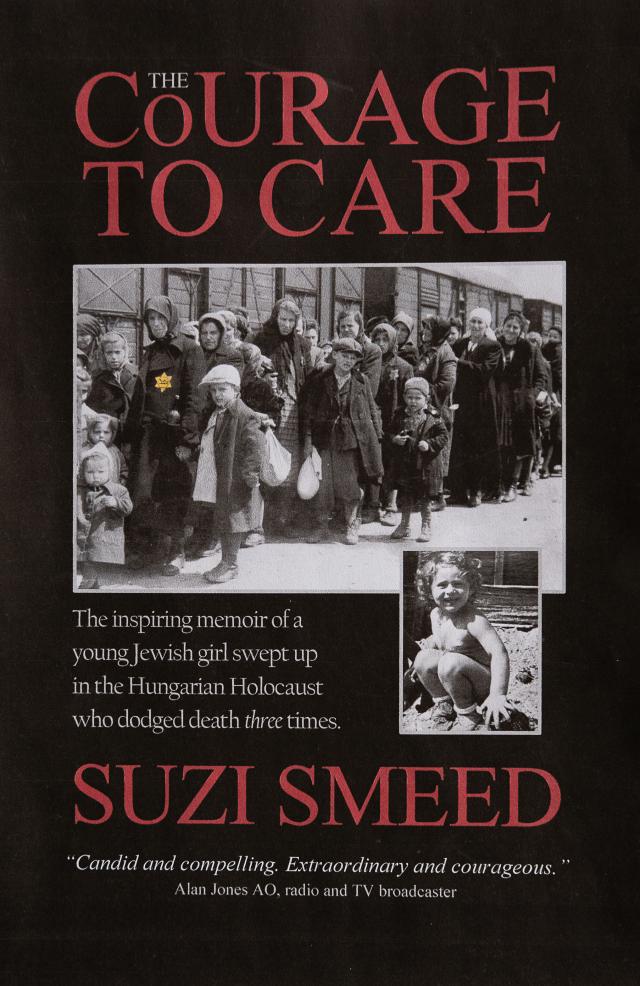Zsuzsanna Kalmar was just two years old when Nazi tanks rumbled into Budapest on 19 March 1944 to entrench the Nazi occupation of Hungary in what Winston Churchill described as “the greatest, most horrible crime ever committed in the history of the world”.
Adolf Eichmann, known as the ‘architect of the Holocaust’, immediately fired up the Nazi killing machine that had exterminated millions of European Jews and in just 56 days from 15 May to 9 July 1944, transported more than 437,000 Hungarian Jews to Auschwitz-Birkenau, most of whom were gassed upon arrival.
Zsuzsanna, who now lives in Noosa and is known as Suzi Smeed has recorded her extraordinary life in a book, co-written with journalist Terry Quinn, called The Courage to Care, A memoir of the Hungarian Holocaust.
It’s a story she shares with school children through The Courage to Care organisation in the hope “the story of the Holocaust will be passed on to future generations and the history not forgotten”.
From 1944 to 1949, Suzi and her family escaped death several times at the hands of both the Germans and the Russians who ‘liberated’ Hungary in early 1945 before imposing their own form of brutal oppression. Not practising Jews her parents even converted to catholicism to avoid persecution, to no avail.
Zsuzsiki was the daughter of Erzsebet and Laszlo Kalmar, a Jewish textile merchant in Budapest. Within weeks of the Nazis arrival Laszlo was in a slave labour battalion and she and her mother were in the small town of Papa, where her grandparents Jeno and Irma Halasz lived.
“On May 23rd 1944, my mother, grandparents and I were rounded up in Papa, Hungary and placed in a ghetto. My mother and I were smuggled out by a lay priest named Jonas Ochiny. After being reunited with my father, who escaped a Labour camp, we went into hiding,” Suzi said.
“In November 1944 as the Soviets were approaching Budapest, my parents sent me with former maids to friends in the countryside.”
Unknown to them heavy fighting in the countryside forced the maids to abandon the little girl at an orphanage (150km east of Budapest) that was later disbanded and she was hidden with six different families.
“In January 1945 with the Soviets occupying Budapest my parents set out on foot to find me. They found me on a farm, hidden in a barn where I slept in a wooden feed tub.”
“After returning to Budapest we waited on news of my grandparents. At the end of 1947 we had news that a friend had witnessed them being taken to the gas chambers,” Suzi said.
“My father applied for a visa to migrate to the USA. With a communist controlled government he was offered a chance to work in the USA leaving my mother and me behind. My father declined. After finding out there was a warrant for his arrest with the secret police we knew we had to escape. We were smuggled out of Budapest to Vienna in a postal van.
“We lived in Vienna until a relative who had already migrated to Australia paid for our passage.
“The second time I visited Hungary on my 60th birthday, in Papa I found my name on the original Nazi list for deportation, a very emotional moment.”
Finally safe in Australia in 1949, Suzi struggled to adjust to her new life as a ‘reffo’.
Her father had nine pounds in his pocket when they arrived and they spoke no English.
They approached the Catholic Church which offered Suzi a place in a boarding school in Maitland which she described as “terrifying”.
In her adult life Suzi experienced two failed marriages and endured the death of her premature infant son.
She has also enjoyed a stint as a star of a TV shopping channel. As manager of the Strand Arcade in Sydney she was invited on to the Bernard King Show. She brought along merchandise from various shops and her one visit turned into a three-year television spot as Suzanne of the Strand.
At the age of 40, Suzi met her husband John Smeed, the man who would change her life.
Now in her eighties, Suzi volunteers with Courage to Care to teach future generations about the lessons of the Holocaust to keep a light shining on anti-Semitism because… “history shows that it can easily escalate from bigotry to genocide if good people ignore bad things”.
“Courage to Care is an outstanding organisation that was change making for me,” she said. “In later life it feels that I am doing something of real value for the community,” she said.
Teachers have told her, her talks to pupils of her survival and return to live after the Holocaust have been a wonderful lesson to a young audience. One pupil described her story as “inspiring and encouraging”. “I know that I need to not judge others because I do not know what their past and present story is,” the student said.
“People need to realise it’s not that bad in Australia,” Suzi said. “It’s not how you start out, it’s how you finish up. It’s what you do with your life.”
With no recollection of her war time experiences Suzi said creating the book had been an extraordinary experience during which she had discovered more about the history of the period and of her family and it introduced her to some amazing people including the Ambassador of the State of Israel to Australia HE Amir Maimon who has written a forward in her book.
The Courage to Care by Suzi Smeed, published by Connor Court Publishing, will be launched in Noosa on Tuesday 2 May from 5.30-8.30pm at Noosa Boathouse, 194 Gympie Tce, Noosaville following the initial launch in Brisbane on Thursday 27 April at the Brisbane City Hall with radio presenter Alan Jones as MC. The book is available at Annies Books on Peregian, The BookShop at Caloundra and Brumby Sunstate Books.









